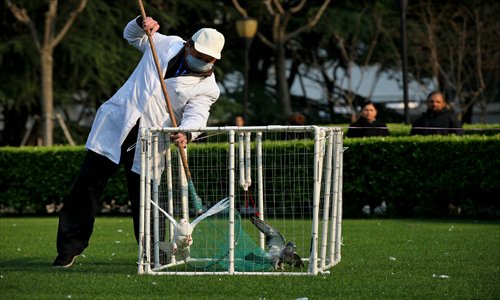Three more cases of bird flu reported

Three more people on Sunday were confirmed to be infected with the deadly H7N9 bird flu virus which has killed six people nationwide, putting the total number of infections at 21. Meanwhile, heath authorities are trying to reassure the public via timely reports and updated treatments.
One of the infected included a 55-year-old man from Bozhou, Anhui Province, who was involved in a poultry slaughter business, the provincial health department said.
Another two male patients, aged 59 and 67, developed flu symptoms in late March and were later diagnosed with pneumonia, the Shanghai Municipal Health and Family Planning Commission said.
As of Sunday night, Shanghai remained the worst-hit region with 10 infected people, including four deaths. Neighboring Jiangsu Province reported six infections, followed by Zhejiang with three, including two deaths. Anhui detected two.
The National Health and Family Planning Commission (NHFPC) reaffirmed Sunday that all infections were "sporadic" and no cases of human-to-human transmission had been found.
Despite the government's efforts to ease public concerns via the timely publication of related information, the rise in new infections and lingering fears caused by the 2003 SARS outbreak are fuelling the problem.
"Nobody in the entire medical field has had the chance to conduct mature studies on the H7N9 bird flu virus yet," Lu Hongzhou, a deputy director of Shanghai Public Health Clinical Center, told the Global Times Sunday, adding that the best way he could advise to prevent infection was to stay away from live poultry.
Major cities including Shanghai, Nanjing in Jiangsu Province and Hangzhou in Zhejiang Province have all suspended the poultry trade.
Yu Kangzhen, chief veterinarian at the Ministry of Agriculture, told media that the virus was detected mostly in the Shanghai poultry market, and no virus had been found in poultry farms, but it is possible the virus would be detected if the search was widened. He added that no H7N9 virus has been detected in pigs.
A new type of injection, developed by the China Academy of Military Medical Science, has been approved for production to combat the virus.
"The injection can relieve some of the symptoms resulting from the flu but it cannot guarantee curing the disease," an epidemiology researcher from the Chinese Center for Disease Control and Prevention (CDC), who requested anonymity, told the Global Times on Sunday, adding that only vaccinations could completely prevent the spread of the virus, but it would take at least six months to develop such a vaccine.
The source added that the system of monitoring animal virus carriers should be enhanced.
In the first cure plan released by the NHFPC earlier, a traditional Chinese medicine, Isatis Root Beverage, or Ban Lan Gen in Chinese, was included, igniting discussions regarding its effectiveness. The State Administration of Traditional Chinese Medicine said Sunday that it would slightly adjust the TCM therapy.
China Central Television reported Sunday that a 4-year-old girl infected with the H7N9 virus has almost recovered after days of treatment.
The Chinese Center for Disease Control and Prevention is also working with its US counterpart to fight the new virus, which experts said may be spread by migratory birds.